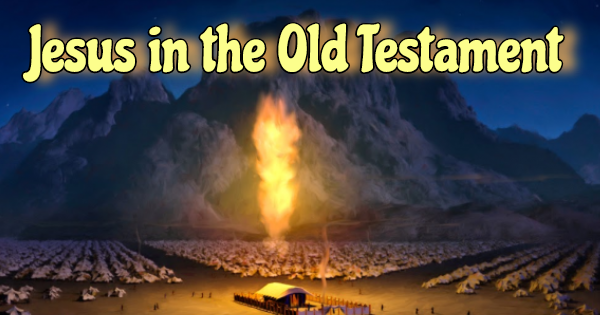Proofs That Jesus Christ Existed and Interacted With People in Old Testament Times
The Bible holds an unending parade of truths regarding history, prophecy, moral teachings, and other information that is so very important for the committed Christian to understand. Some of these truths are essential for the believer — matters of salvation, we call them — while others are of interest but not essential to our spiritual walk with the Creator.
The matter of understanding the pre-existence of Jesus Christ is somewhere between these two poles: we do not absolutely need to understand the truths of this issue, but if we get it wrong we can be misled into denying the very things our Master said about Himself. That error can lead to more serious errors, and can eventually lead a person into denying that Jesus Christ is indeed our personal Savior, the One who paid the price for our sins in order that we might have eternal life, thus fulfilling our purpose for being born. I have personally witnessed this sad scenario with some of my friends.
The truths of Scripture speak for themselves, not as transliterated by some theologian who wishes to place himself in the shoes of God. “Line up line, precept upon precept” (Isaiah 28:10), the Biblical truths are of no private interpretation (II Peter 1:20). We need to heed them and gain a more complete grasp of just who is this Elder Brother of ours who was willing to sacrifice His life for our lives by taking on human flesh, in order to suffer and die that we might have eternal life. Now that is love … love as it ought to be within each of us!
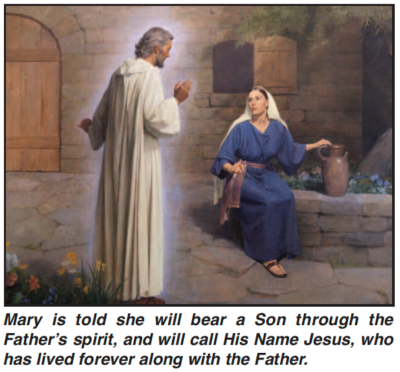
Jesus Forecast to Come in the Flesh
We know from over 300 Old Testament citations that the Savior was prophesied to come to this earth to pay for the sins of all mankind. That promise revealed in so many places should leave no one questioning the reality of His coming … first to live a humble, perfect life amongst men while healing, casting out demons, performing miracles, and preaching the good news of the coming government of God, within which He will be King of Kings and Lord of Lords.
In fact, every book of the Bible announces the coming of the Savior to the world. Notice the examples on the next page as revealed from Genesis to Revelation.
These prophesies and allusions to Jesus Christ’s coming found throughout the Old Testament confirm that the Messiah was indeed going to come. Yet, the foretelling of His coming does not prove that He existed during that Old Testament period, from the dawning of the age in Genesis 1:1 to the intertestamental period following Malachi 4:6. Let us first of all examine what Christ Himself and others said about this preexistence.
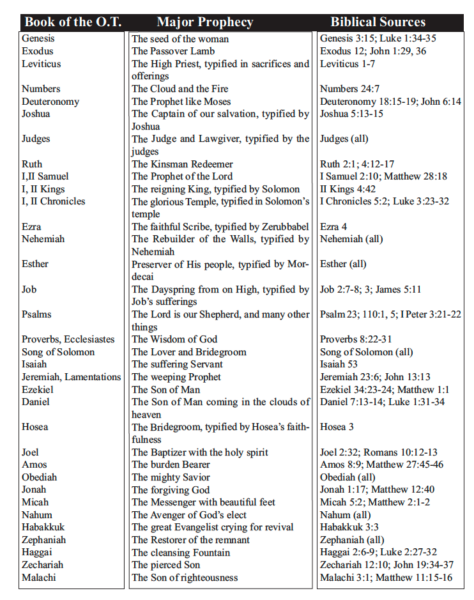
a. I John 4:3. “And every spirit that confesses not that Jesus Christ is come in the flesh is not of God.” This verse indicates that Jesus Christ had to exist somewhere else as a Being before He was made flesh. See also II John 7: “For many deceivers are entered into the world, who confess not that Jesus Christ is come in the flesh. This is a deceiver and an antichrist.” Coming “in the flesh” indicates that the spirit of Christ, the spirit being the “real being,” was the individual that had existed beforehand. The same can be said for every one of God’s people; see Hebrews 2:14. Come in II John 7 is the Greek word erchomai, meaning “to come from one place into another; to come into,” implying that Christ came from somewhere else (in heaven as spirit) to another place (to earth as physical).
b. John 17:5. “And now, Father, glorify Me with your own self with the glory which I had with You before the world was.” Clearly Jesus Christ, who said these words, existed before this present world (cosmos, “orderly arrangement”, or society) was set in place.
c. John 17:18. “As You have sent Me into the world, even so have I also sent them into the world.” It was the Father who took Christ from His previous existence in the spirit realm and placed Him here in the physical world.
d. John 17:21-25. “… that they all may be one, as You, Father, are in Me, and I in You, that they also may be one in us; that the world may believe that You have sent Me. And the glory which You gave Me I have given them, that they may be one, even as We are one; I in them, and You in Me, that they may be made perfect in me; and that the world may know that You have sent Me, and have loved them, as You have loved Me. Father, I will that they also, whom You have given Me, be with Me where I am, that they may behold My glory which You have given Me; for You loved Me before the foundation of the world. O righteous Father, the world has not known You, but I have known You, and these have known that You have sent Me.” Christ stated that the Father had “sent Me” … from where? From some place in the physical realm? No, from the spirit realm where He preexisted with the Father. How could the Father love Him “before the foundation of the world” [cosmos] unless He preexisted in heaven with the Father so that He could be loved in that place?
e. Philippians 2:6-8. “… who, being in the form of God, thought it not robbery to be equal with God [i.e., a spirit who looked like the Father, and was in His spirit family according to a father-son relationship], but made Himself of no reputation and took upon Him the form of a servant, and was made in the likeness of men; and being found in fashion as a man, He humbled Himself, and became obedient unto death, even the death of the stake [ Greek stauros].
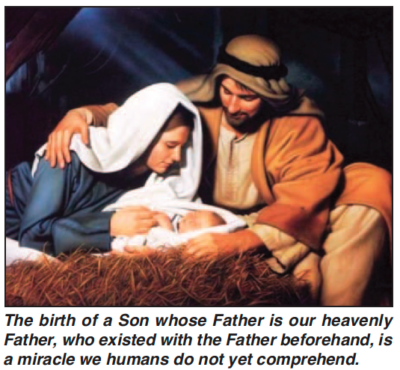
f. John 1:15. “John bare witness of Him, and cried, saying, ‘This was He of whom I spoke, He that comes after me is preferred before me, for He was before me.’” Jesus was born after John the Baptist, so Jesus came into the world “after” John; thus, “He was before me” can only mean that Christ existed before John, in the heavenly realm.
g. John 6:38. “For I came down from heaven, not to do my own will, but the will of Him that sent Me.” Christ was sent from the spirit realm to live on earth as a flesh and blood human being. See also John 6:42 and 51, where Jesus also said He “came down from heaven.”
h. John 16:27-28. “For the Father Himself loves you, because you have loved Me, and have believed that I came out from God. I came forth from the Father, and now come into the world: again, I leave the world and go to the Father.” Here Christ said He came directly from the Father.
i. Ephesians 4:8-10. “Wherefore he says, ‘When He ascended up on high, He led captivity captive, and gave gifts unto men.’ (Now that He ascended, what is it but that He also descended first into the lower parts of the earth? He that descended is the same also that ascended up far above all heavens, that He might fill all things.)” Clearly Christ, who ascended to the Father in heaven after His crucifixion, first descended to the earth to live amongst men as flesh and blood.
j. John chapter 8:
Verse 12. “I am the light of the world.” See Exodus 3:14 where God calls Himself “I AM”.
Verse 18. “I am One who bears witness of Myself ….”
Verse 21. “I am going away ….”
Verse 23. “You are from beneath; I am from above …. I am not of this world.”
Verse 24. “… if you do not believe that I am ….”
Verse 28. “… then you will know that I am ….”
Verse 42. “I proceeded forth and come from God.”
Verses 57 and 58. “… before Abraham was, I am.”
In these verses of John 8, Christ identified Himself with the God who claimed He was the “I AM” who talked to Moses from the burning bush, and also claimed that He existed before Abraham. The Jews understood what He meant, and as a result they tried to stone him!
k. Luke 10:18. “And He said unto them, I beheld Satan as lightning fall from heaven.” This fall is recorded in Isaiah 14:12, so Christ had to exist long before His birth as a human to be able to witness this event.
l. I Corinthians 10:1-4. “Moreover, brethren, I would not that you should be ignorant, how that all our fathers were under the cloud, and all passed through the sea; and were all baptized unto Moses in the cloud and in the sea; and did all eat the same spiritual meat, and did all drink the same spiritual drink: for they drank of that spiritual Rock that followed them, and that Rock was Christ.” This passage clearly shows that Christ was the One that nurtured Israel in the wilderness, and He therefore long preexisted His time as flesh and blood on the earth.
m. Micah 5:2. “But you Bethlehem Ephratha, though you are little among the thousands of Judah, yet out of you shall come forth to Me the One to be ruler in Israel, whose goings forth are from old, from everlasting.” Jesus Christ is said here to have existed “from everlasting,” so He had to eternally exist before His sojourn upon the earth. This fits with Isaiah 9:6, which states that the government of God will increase endlessly throughout eternity.
n. John 1:1-5, 14. “In the beginning was the Word, and the Word was with God, and the Word was God. The same was in the beginning with God. All things were made by Him, and without Him was not any thing made that was made. In Him was life, and the life was the light of men. And the light shines in darkness, and the darkness comprehended it not …. And the Word [Jesus Christ] was made flesh and dwelt among us (and we beheld His glory, the glory of the only begotten of the Father), full of grace and truth.” It is clear that the Word is equated with Jesus Christ in this Scripture, and that He created the things we see around us. This requires that He existed before his physical sojourn on earth by at least thousands of years, since the earth was redesigned about 4,000 years before Christ was born. Genesis 1:26 states, “And God [Elohim] said, ‘Let us make man in our image, after our likeness …,’” a statement showing that the Father and the Son [Christ], and perhaps other God-beings, were directly involved in the earth’s recreation, since Elohim as used in this passage is a plural noun.
o. Matthew 14:33. “Then they that were in the ship came and worshiped Him, saying, ‘Of a truth You are the Son of God.’” Only deity can be worshiped, and Christ did not prevent the disciples from worshipping Him. This shows that the story of Luke 1, the virgin conception of Mary by the Father, is accurate.
p. Luke 1:34-35. “Then said Mary unto the angel, ‘How shall this be [the birth of Jesus to her], seeing I know not [have had no sexual intercourse with] a man?’ And the angel answered and said unto her, ‘The Holy Spirit shall come upon you, and the power of the Highest shall overshadow you; therefore also that holy thing which shall be born of you shall be called the Son of God.’” Here the process of introducing the spiritual conception of Jesus Christ into Mary’s egg is predicted as coming directly from the Father, who would “come upon her” and “overshadow her.” The essence of a living human is the spirit of that person, so this spirit of Christ had to preexist with the Father, and was given to Mary’s egg by the Father at His conception. (See Paul’s statement in Philippians 1:23.)
q. Colossians 1:13-18. “… who has delivered us from the power of darkness, and has translated us into the kingdom of His dear Son: in whom we have redemption through His blood, even the forgiveness of sins: who is the image of the invisible God, the firstborn of every creature: for by Him were all things created, that are in heaven, and that are in earth, visible and invisible, whether they be thrones, or dominions, or principalities, or powers: all things were created by Him and for Him: and He is before all things, and by Him all things consist. And He is the head of the body, the church: who is the beginning, the firstborn from the dead; that in all things He might have the preeminence.”
The modern-day teaching of Christ not preexisting is highly similar to the beliefs of gnosticism that infected the early Church. See Prophecy Flash!, Volume 7, Number 3, pages 40 to 43, for an excellent review of this subject.
If a person rejects the preexistence of Jesus Christ before His human birth, he must also reject the clear teachings of God’s word in many places, and twist Scripture to fit his thinking. He must also presume that Jesus was born with sin by a human father, and thus would be unable to fulfill the awesome responsibility of being the perfect sacrifice for sin. Besides, his view of God as a family having more than one being is impossible to achieve, even though Scripture teaches that God is a family [patria].
Jesus Christ came from the spirit realm where He was with the Father, to live a sinless life in the flesh. He divested Himself of that spirit existence to become fully flesh, like us, as John 1:14 states: “And the Word was made flesh, and dwelt among us ….” If this had not been the case He could not have become the sacrifice for our sins. He succeeded in overcoming, and willingly gave His life for us.
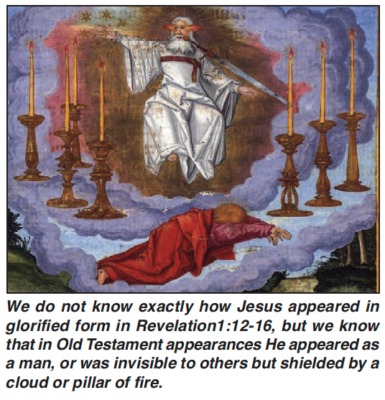
Proofs of Old Testament Existence
While we have shown that Christ did surely exist before He was born of a virgin, are there any proofs that any of the spirit beings mentioned in the Old Testament were truly Jesus Christ Himself? There are indeed such proofs, and I will discuss several proofs that are irrefutable.
We must be careful not to assume that whenever the term “Angel of the Lord” is mentioned that this spirit being refers to Jesus Christ. This temptation is fueled by the idea that there are only two God-beings within the term Elohim. This idea is erroneous, and can be disproven by several scriptures, such as the following.
a. Psalm 97:9. “For You, Lord, are high above all the earth; You are exalted far above all gods [Elohim].” Many gods [Elohim, plural of “god”] are indicated here, Yahweh, or Israel’s God, being above all of the rest, and they are not shown to be mere idols or figments of the imagination. They are equated as gods alongside Yahweh but inferior to Him.
b. Psalm 45:6-7. “Your throne, O God, is forever and ever; the scepter of Your kingdom is a right scepter. You love righteousness and hate wickedness: therefore God, you God, has anointed You with the oil of gladness above Your fellows.” In each of the three cases that the word God is used in these verses, the Hebrew word is Elohim. Since the God of verse 6 is identified with Yahweh, Israel’s God, then the “God, your God’ of verse 7 must refer to the Father, for He is the one who anointed the God of verse 6; the superior can only anoint the lesser individual, not vice-versa. This verse indicates that Christ, who loved righteousness and hated wickedness, was selected from quite a number of spirits in the God plane to be given the “oil of gladness” (gladness = sason “cheerfulness, specifically welcome”). Would not being selected from amongst many companion Sons of God in the God-realm, to be the announcer of the coming Kingdom of God to men, and to be the Savior of these men, bring much gladness to the Father?
c. Job1:6. “Now there was a day when the sons of God [Elohim] came to present themselves before the Lord, and Satan came also among them.” (See also Job 2:1.) In both references Satan is shown to be a “son of God,” as is Jesus Christ shown to be a Son of God (Matthew 14:33; 16:16; 26:63; etc.). Adam is also a son of God, who was the first created human being in Eden (Luke 3:38). All being sons of God, they were spirits within the God plane (Elohim).
d. Deuteronomy 6:4. “Yahweh is our Elohim, be one with Him.” This verse in the King James Version says, “The Lord our God is one Lord,” Which does not give the proper sense of the original Hebrew. The Tanakh translates the sentence as follows: “The Lord is our God, the Lord alone.” This verse implies that there is more than one member within the term God.
e. Psalm 97:9. “But You, Lord, are most high above all the earth; You are exalted far above all gods [Elohim].” This scripture is saying that other gods exist, but the Lord [Yahweh] is greater than all of them, while not denying their existence.
f. Deuteronomy 32:8-9. “… when the Most High [the Father] divided their inheritance to the nations [the 70 nations a Babel; Genesis 10], when He separated the sons of Adam [by confusing their tongue at Babel], He set the boundaries of the peoples according to the number of the sons of Elohim. For the Lord’s portion is His people; Jacob is the place of His inheritance.” Here we read that the 70 nations were separated at Babel and migrated to the places they were supposed to, and each nation had a “son of Elohim” assigned to it. Thus, there were at least 70 spirits involved here. The phrase “sons of Elohim” is the correct translation for these individuals, not “children of Israel” as translated in the KJV and NKJV.
Some of these sons of Elohim are anything but pure, for example Satan the devil as seen in Job 1:6 and 2:1, and also the spirit that approached the Lord and volunteered to be a lying spirit to the prophets that ultimately convinced Ahab to battle against Ramoth Gilead (I Kings 22:17-23).
Indeed, there is not just one son of Elohim in the spirit realm. There are many, how many we do not know. Note in Hebrews 1:6 that the firstborn (the saints) are sons of God, alongside Jesus Christ, showing God’s plan to greatly expand the numbers of sons of God. On the other hand, angels are ministering spirits for those who are to inherit salvation (Hebrews 1:14).
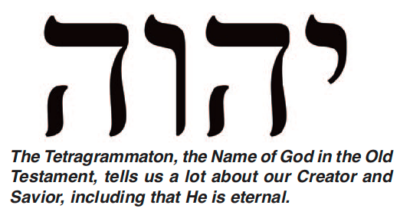
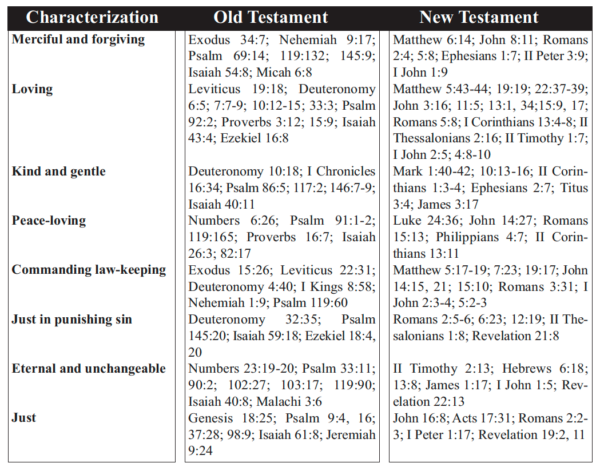
Jesus Christ in the Old Testament
I have given below ten proofs of Jesus Christ being mentioned in the Old Testament.
1. The name Jesus Christ is used nowhere in the Old Testament. However, we can examine the character of God in both testaments and see they are the same. Note the table on the next page.
2. The name of Jesus reveals He is Eternal, just as does the name Yahweh. The Hebrew name YHWH is difficult to interpret, but can be defined as “He who causes ‘that which is’ to be” (abarim-publications.com). It is an archaic form of the verb “to be” (Hebrew hawah), meaning “I am who I am, or I will be who I will be” (agapebiblestudy.com). Some define the word as meaning “Being,” “He is,” or “He will cause to be,” implying that He was, is, and will be. In other words, YHWH is eternal; He has existed and always will exist. Time is infinite for Him, and without the eternal time in which He exists all activity and energy would cease to exist; there would be nothing.
Indeed, in the book of Revelation Jesus Christ states three times that He is the Alpha and the Omega, the first and last letters of the Hebrew alphabet.
“‘I am the Alpha and the Omega, the Beginning and the End,’ says the Lord, ‘who is and who was and who is to come, the Almighty’” (Revelation 1:8; see also Revelation 16:5).
“I am the Alpha and the Omega, the First and the Last” (Revelation 1:11; see also verse 17).
“I am the Alpha and the Omega, the Beginning and the End, the First and the Last” (Revelation 22:13; see also Revelation 21:6).
Interestingly, each of these six statements begins with “I am,” the very words spoken by God out of the burning bush in Exodus 3:14: “And God said to Moses, ‘I AM WHO I AM.’And He said, ‘Thus you shall say to the children of Israel, “I AM has sent me to you.’’’ The word for God in Exodus 3:14 is the Hebrew Elohim, which thus is identified with Jesus Christ in Revelation 1 where the one who is declared Alpha and Omega, the Beginning and End is “… He who lives, and was dead, and behold, I am [there are those words again!] alive forevermore” (Revelation 1:18).
It appears that the word Elohim in Exodus 3 and elsewhere in the Old Testament can refer to not just one eternal deity, but to several depending on whether a singular or plural verb is associated with this noun. Thus, in Genesis 1:26 we read God as Elohim in the plural form: “Let us make man in Our image, according to Our likeness.” More than one spirit being was involved in this creation, and most likely many more Gods than just the Father and the Son (Jesus Christ). Both terms — Yahweh and Elohim — are not always used for specific singular individuals in the Old Testament in all cases, but can refer to other divine spirits as well.
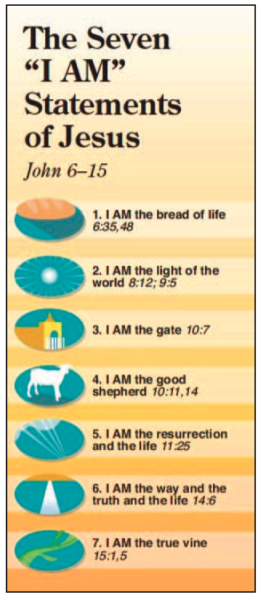
Several instances in the Old Testament show that Yahweh is eternal. Note these three.
“Who has performed and done it, calling the generations from the beginning? ‘I, the Lord [Yahweh] am the First; and with the last I am He’”(Isaiah 41:4).
“Thus says the Lord [Yahweh], the King of Israel, and his Redeemer, the Lord [Yahweh] of hosts; ‘I am the First and I am the Last, besides Me there is no God’” (Isaiah 44:6).
“Listen to Me, O Jacob, and Israel, My called: I am He, I am the First, I am also the last” (Isaiah 48:12
Do not these statements sound very much like Jesus Christ speaking of Himself in Revelation? They surely do. The I AM, the Beginning and the End, and the Eternal living God show the identity of Jesus Christ in the New Testament with Yahweh, and even Elohim, in the Old Testament.
3. Jesus Christ is termed the Creator in the New Testament, even as God [Elohim] was the Creator in the Old Testament. Note several New Testament scriptures.
“In the beginning was the Word, and the Word was with God, and the Word was God. He was in the beginning with God. All things were made through Him, and without Him nothing was made that was made …. And the Word became flesh [Jesus Christ] and dwelt among us …” (John 1:1-3, 14).
“… and to make all men see what is the fellowship of the mystery, which from the beginning of the world has been hidden in God, who created all things by Jesus Christ …” (Ephesians 3:9).
“For by Him all things were created that are in heaven and that are on earth, visible and invisible, whether thrones or dominions or principalities or powers. All things were created through Him and for Him” (Colossians 1:16).
“God … has in these last days spoken to us by His Son, whom He has appointed heir of all things, through whom also He made the worlds …” (Hebrews 1:1-2).
“You are worthy, O Lord, to receive glory and honor and power; for you created all things, and by Your will they exist and were created” (Revelation 4:11).
Now, we can look at Old Testament scriptures and note that Yahweh is noted for creating all that is as well.
“By the word of the Lord [Yahweh] the heavens were made, and all the host of them by the breath of His mouth” (Psalm 33:6).
Does not this sound very much like John 1:1-3, where the Word (Jesus Christ) created all that is? Moreover, we read in Genesis 1 of the recreation of the earth by Elohim: the land masses, atmosphere, plants, living creatures of all sorts, and then mankind in His very own image. Then throughout the Old Testament there are references to Yahweh and Elohim having made the heavens and the earth: Nehemiah 9:6; Psalm 96:5; 8:3-8; 33:6; 121:2-8; 19:1; Isaiah 37:16; 45:18; 42:5; 44:24; Proverbs 3:19; Jeremiah 10:12-13; Amos 4:13.
We understand that the Father was also directly involved in the creation, as Ephesians 3:9 states, “… God, who created all things by Jesus Christ ….” Hebrews 1:1-2 says much the same thing. The Father and a Son work together in perfect harmony as a family ought to work.
4. Who is the “I AM” before Abraham? That can be no one else but Christ Himself in His pre-incarnate spirit form, as we come across Him as “I AM” at the burning bush (Exodus 3). As we discussed in point 2, “I am” is used to describe Jesus in many other instances of Scripture. He is the self-existant One indeed! Jesus in John 8:56-58 said, “‘Your father Abraham rejoiced to see My day, and he saw it and was glad.’ Then the Jews said to Him, ‘You are not yet fifty years old, and have You seen Abraham?’ Jesus said to them, ‘Most assuredly, I say to you, before Abraham was, I AM.’”
5. Moses knew Christ even in his own days in Egypt, for we read in Hebrews 11:23-26, “By faith Moses, when he became of age, refused to be called the son of Pharaoh’s daughter, choosing rather to suffer affliction with the people of God than to enjoy the passing pleasures of sin, esteeming the reproach of Christ greater riches than the treasures in Egypt; for he looked to the reward.” Moses knew of Christ even in his own day, exactly how we do not know, but it is possible that Yahweh revealed Himself in a personal way many years before the burning bush incident. Moses personally understood the Son of God in ways that are not recorded, and He was so powerful a Mentor to him that Moses was convicted to avoid the idolatry, sexual sins, sorcery, and other evils that consumed Egyptian life in high circles.
6. Jesus was the One who brought Israel out of Egypt, and kept watch over the nation throughout their journeys.
a. He was the One who engineered the ten plagues that destroyed Egypt and her idols: “… the Lord, having saved the people out of the land of Egypt” (Jude 5). Through Exodus 7 to 12, the Lord [Yahweh] was the One who caused the water to turn to blood, frogs to multiply, dust to become lice, flies to swarm, livestock to die of disease, dust to cause boils, hail to destroy crops, locusts to cover the land, total darkness to linger for three days, and death to consume all the firstborn.
b. He was the One who was in the cloud by day and a pillar of fire by night, which led Israel through the Red Sea and the wilderness for 40 years. As I Corinthians 10:1-4 states plainly, “… all our fathers were under the cloud and in the sea …. For they drank of that spiritual Rock that followed them, and that Rock was Christ.”
c. He was the One who watched over the nation to insure that it would not self-destruct through absorption by intermarriage with neighboring idolatrous tribes, by terrible diseases like leprosy, and by war and famine; He gave them manna to eat, and protected them from fierce neighboring tribes. He did these things to preserve Israel and ensure that the promises made to Abraham would be fulfilled. “… the Lord [Yahweh in Hebrew] … afterward destroyed those who did not believe” (Jude 5), referring to the 3,000 men killed concerning the golden calf incident (Exodus 32:25-28), the many killed for lusting after flesh (Numbers 11:32-33), and those killed for other grievous infractions.
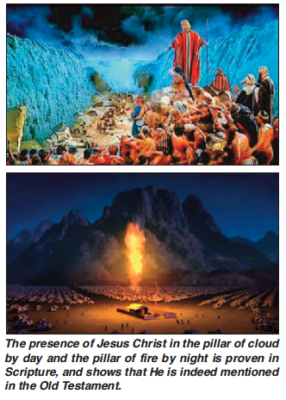
7. Isaiah spoke directly of seeing the glory of Jesus Christ. “‘He has blinded their eyes and hardened their hearts, lest they should see with their eyes, lest they should understand with their hearts and turn, so that I should heal them.’ [quoted from Isaiah 6:10]. These things Isaiah said when he saw His glory and spoke of Him” (John 12:40-41). The quote from Isaiah was spoken by the Lord, using the Hebrew word Adonay, which is akin to Yahweh and a name for God. These words are tied directly to Jesus Christ by John.
8. Jesus is referred to as the One who “… loved righteousness and hated lawlessness; therefore God, Your God, has appointed You with the oil of gladness more than Your companions” (Hebrews 1:8-9, quoted from Psalm 45:6-7). Amongst the many Sons of God, the Savior (which is what Jesus means) excelled and fulfilled the role of Redeemer, sent to earth to atone for the sins of mankind. We know there are many spirits called sons of God, a subject already discussed, and put forward well by Michael Heiser in his book The Unseen Realm (Lexham Press, Bellingham, Washington, 2015), Job in Job 1:6 and 2:2, and elsewhere.
9. Jesus is the “Angel of His Presence” in Isaiah 63:8-9. The text says, “For He said, ‘Surely they are My people, children who will not lie.’ So He became their Savior. In all their affliction He was afflicted, and the Angel of Presence saved them; in His love and in His pity He redeemed them; and He bored them and carried them all the days of old.”
This whole section, Isaiah 63:8 to 19, speaks of the Father together with the Angel of His Presence, that redeemed Israel (verse 9) — Christ is the redeemer who paid the price of His shed blood for all of mankind’s sins — and brought them through the Red Sea (Jesus as the Rock in the cloud and piller; I Corinthians 10:4) as verse 12 says, and put God’s spirit in them as verse 11 says. Thus, we have a record here of the presence of Jesus Christ at the time of ancient Israel.
10. Salvation in Hebrew is the word yshuwah, meaning “deliverance, victory, or prosperity.” It is the name of Joshua, and Jesus Himself, whose Name in the Greek is Iesous, meaning Saviour. A good case can be made for saying that in many cases where the word salvation is used in the Old Testament, reference is being made directly to Jesus Christ, for He is the Author of salvation (Hebrews 5:9). Notice scriptures such as Exodus 15:2, Deuteronomy 32:15, II Samuel 22:51, I Chronicles 16:23 and 35; Job 13:16, Psalm 3:8 and many other references in Psalms, Isaiah 12:2, and on the list goes. In some cases salvation is translated from the Hebrew yesha (II Samuel 22:3, 38, 47), which closely resembles Yeshua, the name many people give to Jesus.
11. Micah speaks of the One who was born in Bethlehem Ephratha, who obviously was Jesus Christ, as having existed forever. Read this plainly in Micah 5:2: “But you, Bethlehem Ephratha, though you are little month the thousands of Judah, yet out of you shall come forth to Me the One to be Ruler in Israel, whose goings forth are from, old from everlasting.”
Our Lord and Savior in the Old Testament!
It is clear that Jesus Christ is indeed mentioned in the Old Testament, as proven by the several points discussed above. We see His character in Yahweh, His Name the eternal I AM, the creation performed through Him by the Father, Moses’ knowledge of Him in Egypt, Jesus’ causing the plagues on Egypt and delivering Israel through the Red Sea and guiding and protecting and punishing them on their journey to Canaan, Isaiah directly viewing His glory, Jesus among His companions and selected to be the Savior, Jesus being the “Angel of His Presence,” and the very word salvation implying the personage of Jesus Christ throughout the Old Testament.
It is very important to understand our Savior’s presence in Old Testament Scripture, for without this knowledge we can be lured into believing that He does not mean what He says, since some people in their self-professed arrogance claim that Jesus began His life as any other human on this earth and did not preexist … has not existed eternally with the Father. The statement by and about Jesus Christ in the New Testament are very clear that Her has existed forever, and as our Advocate to the Father we can rest assured that He will always be present to care for us in the midst of our harshest trials, and will fulfill His promise to make us, His elect, kings and priests who will reign on the earth for 1,000 years, and be with Him forever, as brothers of the Anointed One, and frankly not inferior to Him … but that is another topic that is explored in other discussions concerning His undying love for us.
Do we love our heavenly Father and Jesus Christ at His right hand with all of our hearts, minds, and spirits? That is our calling, that is our future, and that is where we need to be every day, in His loving care for us!


